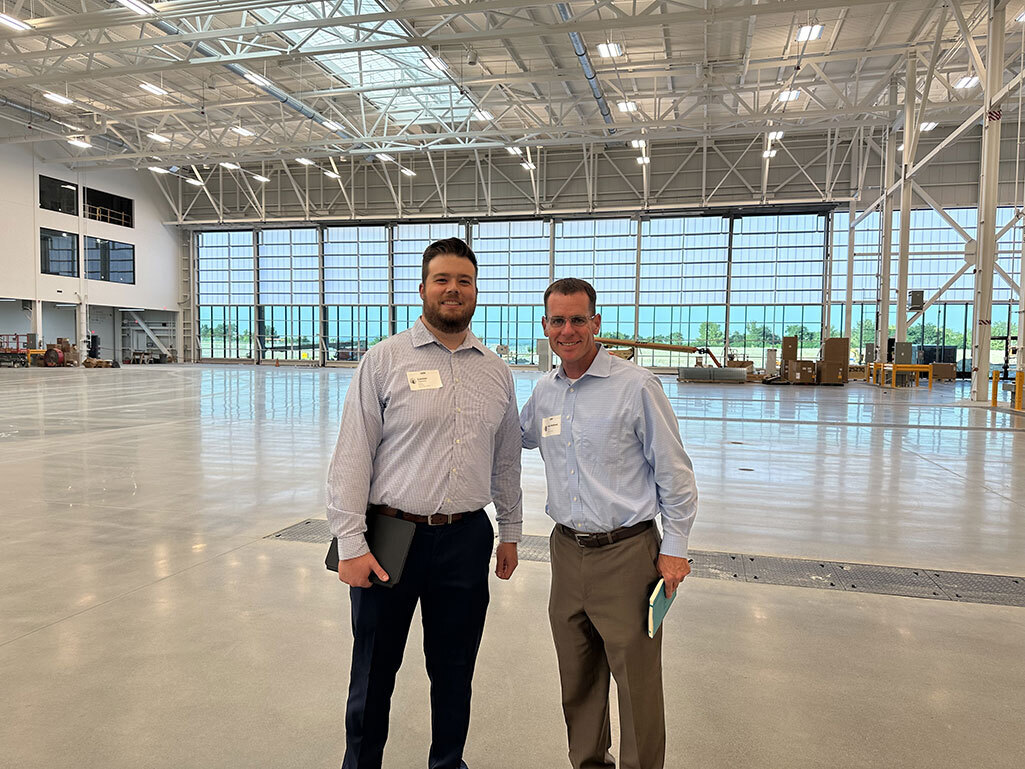Electric aircraft will play a major role in aviation’s striving to be net-zero by 2050. Still, building electric aircraft is a bold undertaking.
BETA Technologies is tackling that challenge and more. The company has launched a fully sustainable production facility at the Patrick Leahy Burlington International Airport in Vermont.

Production has begun on various systems as BETA Technologies moves toward delivery of its all-electric aircraft—the ALIA CTOL and ALIA VTOL—to a wide variety of customers in the defense, medical, cargo and passenger industries.
As a vocal advocate for and supporter of aviation’s net-zero goal, Global Aerospace recently visited the BETA Technologies headquarters. The trip involved a tour of the company’s new state-of-the-art facility.
A Stunning Eco- and Employee-Friendly Facility
The production facility BETA Technologies has built is stunning in its size and breadth, at 188,000 square feet. When it reaches peak production, it will be capable of producing 300 electric aircraft annually. “It’s one of the most impressive facilities I’ve ever seen in my 25-year career,” says Global Aerospace Underwriting Director Nick Methven.

Connor Haarhuis, Senior Underwriter and Nicholas Methven, Senior Vice President, Underwriting Director, Global Aerospace
The building is designed to be highly efficient in terms of energy consumption and manufacturing processes. However, the company also considered the well-being of its workforce when envisioning the space. For example, the facility features floor-to-ceiling windows and a quarter-acre skylight (augmented by tunable lighting systems) to leverage natural light throughout the day and create a more enjoyable work environment for BETA Technologies team members.
A Manufacturing Plant Built on Three Critical Pillars
In designing and building its cutting-edge electric aircraft production facility, BETA Technologies focused on three pillars: sustainability, efficiency and a people-first approach to manufacturing.
The building has 260 geothermal wells for interior temperature control and almost three acres of roof-mounted solar panels. Its structural sub-base supports concrete foundations and is made of an aggregate that is 99% recycled glass and 1% binder. As a result, it replaces nearly 100,000 cubic feet of styrofoam insulation.
The structure’s climate-controlled assembly area is also designed not to waste time or energy. The production line is laid out in a logical manner that emphasizes efficiency and safety. Beyond the manufacturing floor, large windows within the facility visually connect employees to promote teamwork and accelerate collaboration.
What strikes you when touring this impressive facility is the high degree of intentionality involved in its design. No doubt about it: BETA Technologies is committed to producing environmentally friendly aircraft in an ecologically responsible manner.
Generating Interest From Forward-Looking Companies
Achieving aviation’s net-zero goal will require buy-in from organizations with aviation operations. So, it is encouraging that the work BETA Technologies is doing is getting attention. Several companies, including UPS and United Therapeutics, have already placed initial orders for all-electric aircraft and reserved the right to purchase more in the future.
Those types of commitments are a significant vote of confidence for the company. The orders may also drive other businesses to join the effort to make aviation more sustainable. As positive public sentiment about all-electric aircraft and green manufacturing grows, organizations likely will feel they have to get on board or be left behind.
Ambitious Plans and Demonstrable Progress
It is not every day that a company embarks on a mission that will literally change the world, but that is what BETA Technologies has set out to do. Its Founder and CEO, Kyle Clark, has talked about the painstaking process the company has followed to get to where it is today: research, engineering, prototyping, test flying, and the initial phases of certification. And now it is positioned to start capitalizing on those efforts.
As BETA Technologies and other aviation innovators follow their passion for cleaner aviation and make demonstrable progress, their initiatives will only gain momentum and inspire others to follow suit. Given where we are now compared to just a few years ago, it is exciting (and a little mind-boggling) to consider where we could be in a decade.
One fact that is obvious from touring the new BETA Technologies facility, talking with its team members and learning about its partnerships with other top tech providers is that the company will likely still be at the forefront of sustainable aviation. It has well-defined goals, a clear vision of the industry’s future, and now, an advanced manufacturing facility rapidly ramping up production and bringing its ideas to life.
About Global Aerospace
Global Aerospace is a leading provider of aircraft insurance and risk management solutions for the aviation and aerospace industries. Our over 95 years of aviation insurance experience enable us to develop customized insurance programs structured around the needs of our clients. Recognized for our industry leading customer service, we serve as a trusted partner to a diverse range of aviation businesses and their insurance producers. https://www.global-aero.com/
Global Aerospace Media Contact
Suzanne Keneally
Vice President, Group Head of Communications
+1 973-490-8588
Release ID: 788835
